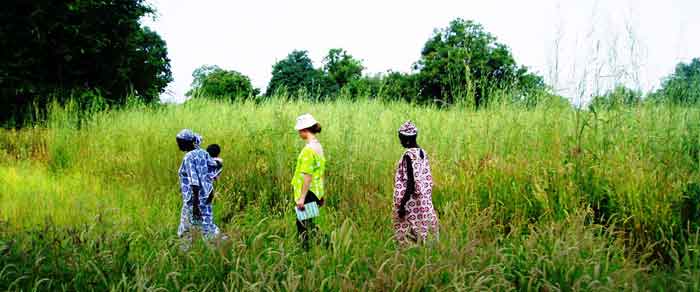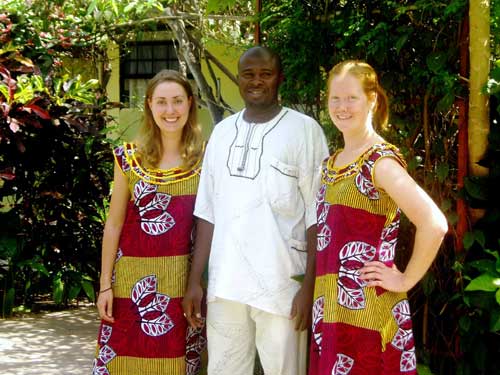2007-2008
Tori Ingram, Intern 2007-2008
Background Bio:
I grew up on a cattle farm in the Kawartha Lakes region in Ontario. Blessed by the support and care of my small community, I developed a strong sense of social and environmental justice and the desire to contribute to global poverty alleviation. In my undergraduate years, I focused on sustainable agriculture, ecology and rural development in an African context. Through these studies, I began to recognize more fully the significant role of international politico-economic policies in creating the 'limits of the possible' with regards to Third World development. As such, I decided to explore these themes more fully at the Master's level. After two years of political science theory (and lots and lots of reading!), I'm excited to have the opportunity to work at the grassroots level with Gambian communities. My previous development experience includes a short-term internship with Global Service Corps as a bio-intensive agriculture (BIA) facilitator in Tanzania. I also spent four years working with Queen's Project on International Development (QPID) - a student-run, not-for-profit development organization that organizes and implements small-scale, sustainable development projects in Guyana, Bolivia, Nicaragua, Nunavut and West Africa.Education:
M.A. Political Science, York UniversityB.A.H. Medial - Biology and International Development, Queen's University
Host Country:
The GambiaInternship Experience:
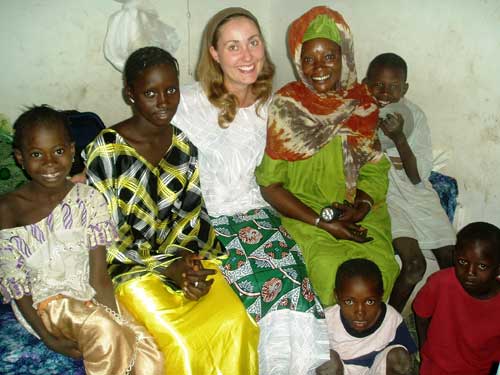 So, how was the Gambia? Well, the short answer is wonderful! The best way to describe life there is to call it a different way of being. To find yourself in a whole new world is a rich, rewarding and tumultuous experience, and I am so grateful for the opportunity to have lived and worked with my Gambian brothers and sisters.
So, how was the Gambia? Well, the short answer is wonderful! The best way to describe life there is to call it a different way of being. To find yourself in a whole new world is a rich, rewarding and tumultuous experience, and I am so grateful for the opportunity to have lived and worked with my Gambian brothers and sisters.
My first week was spent in the capital region of the country with my Wolof language coach and our first topic was greetings. Gambians take the time to greet one another extensively - how are you? how's your family? your mom, your dad etc. Interestingly, 'how are you?' is best translated 'peace do you have?' and the expected response is 'peace only'. You can also respond simply 'I'm here only'. And those responses sum up quite well, the culture and atmosphere of that tiny nation. People are present in the moment, focused on giving to and working with one another in peace and love. Now, that's not to say there aren't any troubles; people have their conflicts and difficulties, as with any other place in this world. But things move with a slower, more steady pace, with a greater sense of community, collective identity, and one might say, generosity of spirit.
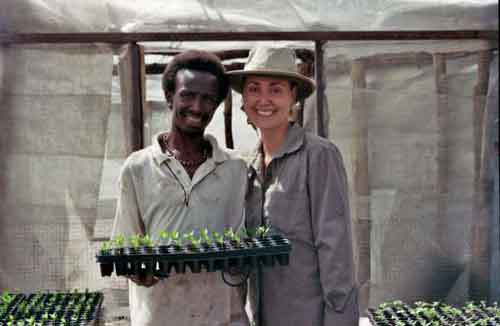 Being in the Gambia was a beautiful step in my own personal journey - to take a step away from Western life and pursue hard work and simplicity in my day-to-day living. After the initial week of language classes, I took the six-hour journey to Njawara Agricultural Training Center (NATC) where I was greeted with open arms, warm smiles, friendly advice and lots of food. It was rainy season, so at least part of everyday water fell down in torrents. If I was not already dripping with sweat from the heat and humidity, I was sure to get damp from an unexpected rain shower. For that first month, I spent my days studying Wolof, working in the fields and helping the NATC women with cooking, laundry and other chores. I was witness to the incredible hard work and energy that people must expend daily in order to survive. It was inspiring. It was exhausting. I often felt overwhelmingly inadequate - I couldn't wash the laundry very well, or stand too long near the smoky cooking fires. I couldn't even communicate properly in their language. Yet, the generosity and acceptance and love that people showed me, let me know that I had a community to depend on and learn from.
Being in the Gambia was a beautiful step in my own personal journey - to take a step away from Western life and pursue hard work and simplicity in my day-to-day living. After the initial week of language classes, I took the six-hour journey to Njawara Agricultural Training Center (NATC) where I was greeted with open arms, warm smiles, friendly advice and lots of food. It was rainy season, so at least part of everyday water fell down in torrents. If I was not already dripping with sweat from the heat and humidity, I was sure to get damp from an unexpected rain shower. For that first month, I spent my days studying Wolof, working in the fields and helping the NATC women with cooking, laundry and other chores. I was witness to the incredible hard work and energy that people must expend daily in order to survive. It was inspiring. It was exhausting. I often felt overwhelmingly inadequate - I couldn't wash the laundry very well, or stand too long near the smoky cooking fires. I couldn't even communicate properly in their language. Yet, the generosity and acceptance and love that people showed me, let me know that I had a community to depend on and learn from.
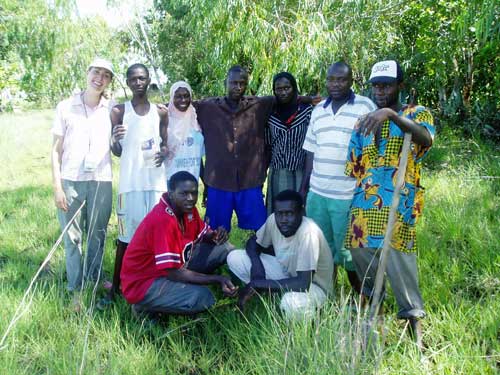 In the early months of my internship, my interactions with NATC staff and community
members provided me with a much broader understanding of the many problems farmers
face in the Gambia: desertification, lack of water/drought, food security/poor
nutrition, the high cost of fertilizers and pesticides, the loss of valuable
seeds and limited access to high-yielding plant materials... This final issue
was ultimately where I focused my work, through the conceptualization and implementation
of a Seed Sustainability and Participatory Plant Improvement (SSPPI) training
program as part of the on-going Agro-Ecological Village project. I spent my days
surveying vulnerable indigenous plant materials in the region, and starting a
seed bank of key species at NATC. I also coordinated efforts to train five villages
on the importance of preserving, testing, multiplying and disseminating good
seeds within and between their communities. This sensitization also helped to
prepare them to receive improved plant materials from REAP. In my final months,
I was able to travel to each of the villages to distribute high-yielding new
varieties of peanuts, corn, cassava, sweet potato and even some high-quality
vegetable seeds.
In the early months of my internship, my interactions with NATC staff and community
members provided me with a much broader understanding of the many problems farmers
face in the Gambia: desertification, lack of water/drought, food security/poor
nutrition, the high cost of fertilizers and pesticides, the loss of valuable
seeds and limited access to high-yielding plant materials... This final issue
was ultimately where I focused my work, through the conceptualization and implementation
of a Seed Sustainability and Participatory Plant Improvement (SSPPI) training
program as part of the on-going Agro-Ecological Village project. I spent my days
surveying vulnerable indigenous plant materials in the region, and starting a
seed bank of key species at NATC. I also coordinated efforts to train five villages
on the importance of preserving, testing, multiplying and disseminating good
seeds within and between their communities. This sensitization also helped to
prepare them to receive improved plant materials from REAP. In my final months,
I was able to travel to each of the villages to distribute high-yielding new
varieties of peanuts, corn, cassava, sweet potato and even some high-quality
vegetable seeds.
The farmers that I was working with showed tremendous knowledge and insight on the seed sustainability issues facing their communities. I learned so much from our exchanges. There was lots of laughter too - on one occasion the farmers even did the Hokey Pokey with me! One of my favourite memories though was when some of the men volunteered to do 'women's work' during a training. Watching a breakdown in the gender barrier was awesome!
By the end of my internship, the landscape had changed dramatically. Where once there was just a mass of green leaves, I could see the stark shapes of buildings and pathways. The dry season had arrived in full force and with it, the strong, dry Saharan winds that covered everything with a thin layer of dust. My departure was difficult, of course, but I was buoyed with a sense of accomplishment and a sense of profound gratefulness for my many experiences there. I still miss my friends and my Gambian family dearly, but that's okay. I got to spend six incredible months with them, and they changed my heart and my thinking forever...
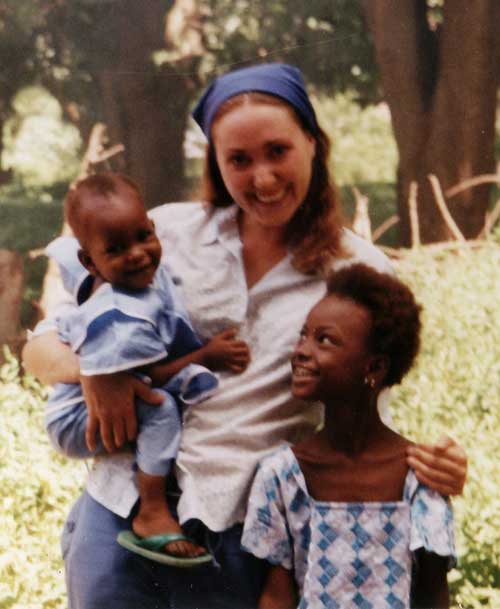 |
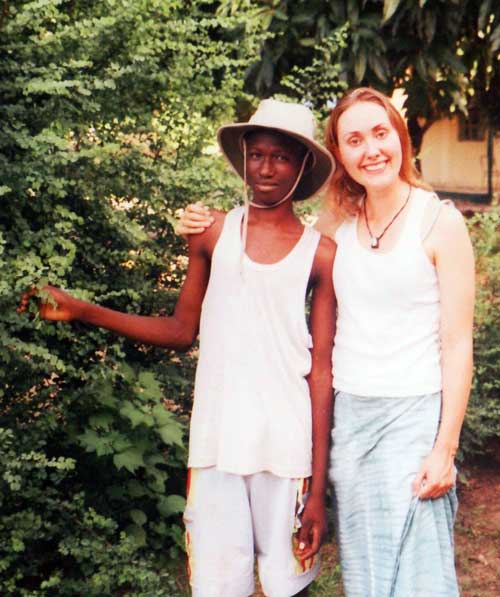 |
Karen Clark, Intern 2007-2008
Background Bio:
Growing up on a dairy farm in the Laurentians region of Quebec, I learned the importance of interactions between people and the natural environment. I decided to increase my knowledge of natural systems by studying environmental sciences at the University of Guelph. Afterwards, I was fortunate to work for a couple of years in a research setting dealing with greenhouse gas emissions from agricultural systems. During the past two years I have been doing a Master’s degree at Université Laval looking at nitrogen dynamics in agricultural soils at cold temperatures. Before starting at R.E.A.P., I was seeking an opportunity to combine what I’d learned at school with the desire to do something concrete in the global community. Going to The Gambia is sure to be an experience that will challenge me personally and will broaden my view of interactions between the natural and human worlds. I hope that I can contribute meaningfully to the lives of people whom I meet in The Gambia and be able to work with them to improve their local agriculture.Education:
M.Sc. Soil and Environmental Science, Université LavalB.Sc. Environmental Science - Major in Earth and Atmospheric Science, University of Guelph
Host Country:
The GambiaInternship Experience:
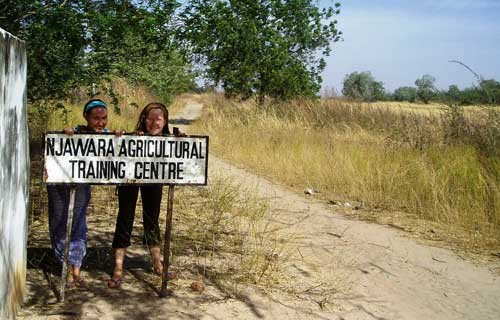
I write this a week after returning home from The Gambia. Part of me feels like
I'm only home for a short visit and that I'm going back soon, even though the
work I set out to do is finished. That feeling will probably stay with me for
quite a while because the people there touched my life so profoundly and made
me see myself and the world around me in a new light. By the end of my six months
there, I felt like I had become Gambian, that I had a role there and was a part
of their community. Most likely because of their kindness, generosity and hospitality.
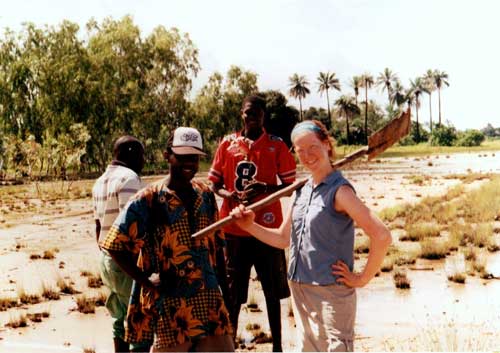 The main focus of my work in the Gambia was researching and promoting
the use of an organic soil amendment called bokashi. Bokashi is a
type of compost that was developed in Asia and is slowly being introduced
in other areas. The wonderful thing about it is that it makes use
of plant residues and agricultural waste products that farmers don't
normally use, and provides them with a rich and effective
soil amendment at very low cost. Working with some of the staff at
the Njawara Agricultural Training Centre (NATC), we tried to determine
what approximate rate of locally produced bokashi should be applied
to local soils. Which means that we had the fun of finding all the
materials to make bokashi and mix it, and then try it out in both
a garden setting (from transplanted pepper plants) and in a nursery
setting for garden seedlings. For me, this really was fun, as I got
to do some dirty work (it involved shovelling both dirt and manure)
and work with some really great people.
The main focus of my work in the Gambia was researching and promoting
the use of an organic soil amendment called bokashi. Bokashi is a
type of compost that was developed in Asia and is slowly being introduced
in other areas. The wonderful thing about it is that it makes use
of plant residues and agricultural waste products that farmers don't
normally use, and provides them with a rich and effective
soil amendment at very low cost. Working with some of the staff at
the Njawara Agricultural Training Centre (NATC), we tried to determine
what approximate rate of locally produced bokashi should be applied
to local soils. Which means that we had the fun of finding all the
materials to make bokashi and mix it, and then try it out in both
a garden setting (from transplanted pepper plants) and in a nursery
setting for garden seedlings. For me, this really was fun, as I got
to do some dirty work (it involved shovelling both dirt and manure)
and work with some really great people.
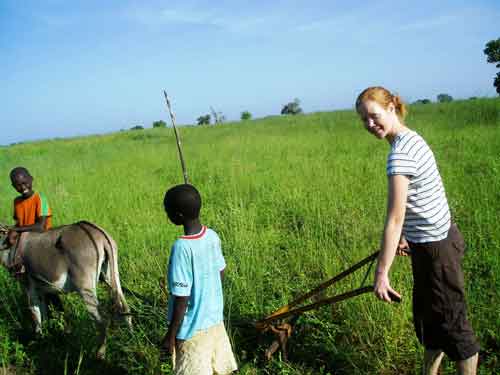 One of the most interesting aspects of my internship was organizing
and leading workshops on producing and using bokashi for farmers in
5 villages. In one-day workshops we discussed general soil health and
fertility, learned each aspect of making bokashi, and then mixing a
pile of it together. What struck me during these workshops was how
difficult farming was in The Gambia and how willing farmers were to
find new ways to improve their livelihood and the health of their soils.
The generosity of these farmers despite their difficulties was truly
remarkable and a challenge to my own spirit of giving. For example,
near the beginning of our internship, Tori and I met with the farmers
in the 5 project villages. Each group welcomed us, fed us, and sent
us home with something. It made me wonder if it were possible that
the less one has, the less strongly one holds onto one's possessions
and the easier it is to share.
One of the most interesting aspects of my internship was organizing
and leading workshops on producing and using bokashi for farmers in
5 villages. In one-day workshops we discussed general soil health and
fertility, learned each aspect of making bokashi, and then mixing a
pile of it together. What struck me during these workshops was how
difficult farming was in The Gambia and how willing farmers were to
find new ways to improve their livelihood and the health of their soils.
The generosity of these farmers despite their difficulties was truly
remarkable and a challenge to my own spirit of giving. For example,
near the beginning of our internship, Tori and I met with the farmers
in the 5 project villages. Each group welcomed us, fed us, and sent
us home with something. It made me wonder if it were possible that
the less one has, the less strongly one holds onto one's possessions
and the easier it is to share.
My internship was much broader than my work. I not only worked in Njawara village, but I lived there and interacted with its people. One of the first things I noted was the incredible peacefulness there. People did not complain or get upset about things that bother people here in Canada. Women cooked over open fires with incredible amounts of smoke, had to walk great distances to find wood to cook their food, and I never heard them complain. They enjoyed life and loved to laugh. They have a great sense of humour and had perfected the arts of banter and teasing.
For two weeks, during Ramadan, I lived with a family. They welcomed
me in as though I was one of their own. They explained to me anything
I didn't understand about their culture, helped me learn Wolof, taught
me to cook over a fire and wash my clothes by hand. They also sat and
chatted and became my friends. Even after I left their home they continued
to treat me as though I was one of the family. I don't think I have
yet come to terms with not knowing if or when I will next see them,
but I do know that I won't forget their kindness to me. I haven't written
about the difficulties of being in the Gambia, and there were some,
but there were so many wonderful things about being there that far
outweighed anything negative. Gambia is truly a wonderful, wonderful
place and I am very blessed to be able to have spent so much time there.
